'African Bees' duo buzzing in Premier Leaguepublished at 11:20 BST 8 April 2022
Brentford's African duo Frank Onyeka and Yoane Wissa are relishing their debut seasons in the Premier League.
Read MoreBrentford's African duo Frank Onyeka and Yoane Wissa are relishing their debut seasons in the Premier League.
Read MoreNigeria's Frank Onyeka and DR Congo's Yoane Wissa chat about their success in the Premier League with Brentford this season.
Read More BBC Monitoring
BBC Monitoring
The world through its media
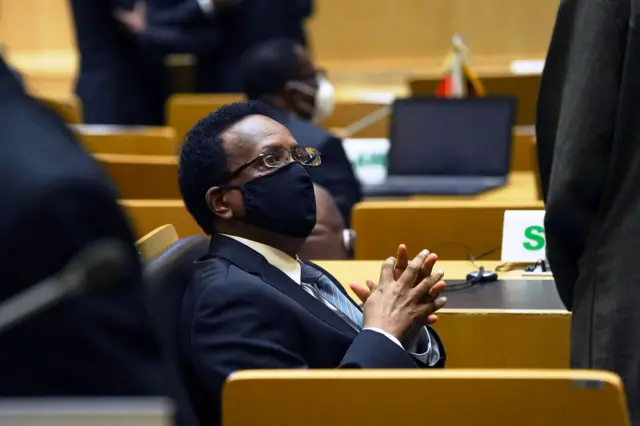 Image source, AFP
Image source, AFPMohamed Abdullahi Farmajo has urged Somali leaders to focus on completing the elections
Somalia's President Mohamed Abdullahi Mohamed, who is also known as Farmajo, has warned politicians to avoid any moves, external that could undermine the security of ongoing parliamentary elections.
In a statement, he urged Somali leaders to focus on completing the elections and resolving any disputes through dialogue.
His comments came hours after Prime Minister Mohamed Roble gave African Union envoy Francisco Madeira 48 hours to leave Somalia.
The president rejected the move, saying his office had "received no complaints of interference [in Somalia's] sovereignty" and did not endorse any illegal action against Mr Madeira.
Kalkidan Yibeltal
BBC News
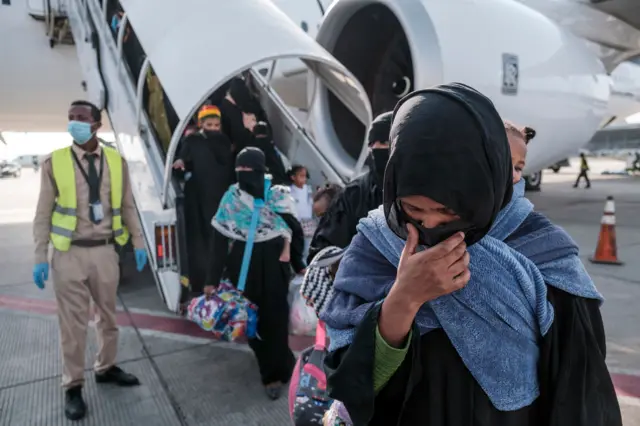 Image source, AFP
Image source, AFPNearly 5,000 Ethiopian migrant workers have returned home in a repatriation campaign
Ethiopia repatriated 101 children from Saudi Arabia on Friday as it continued a campaign to return tens of thousands of its nationals from the country.
Many of of the Ethiopians from the Middle Eastern country are undocumented migrant workers who have been detained in squalid conditions.
More than a week since the drive began close to 5,000 migrant workers have been returned, according to a statement from Ethiopia's women and social affairs ministry.
In a campaign that could take up to 11 months, the authorities have pledged to bring a 100,000 Ethiopians home from Saudi Arabia.
The returnees are provided with temporary shelters and medical support upon arrival.
However, it is not clear if they will be offered a sustainable means of getting income once they settle in.
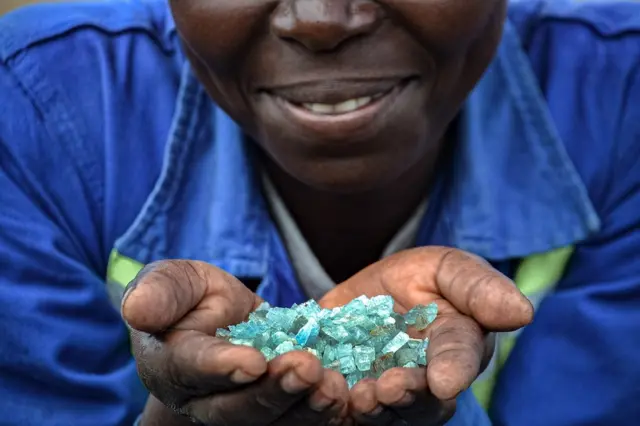
The miners cut and polish the gemstones themselves
Zimbabwe's Zimbaqua mine, which employs an entirely female workforce, has opened a jewellery line to showcase the aquamarine stones they mine.
The mine was set up three years ago to train women and give them opportunities to earn and make a good living for themselves.
Fifteen women joined the project and since then it has grown to include 35.
Mine manager Rumbidzai Gwinji told the BBC Newsday programme the jewellery line was a boost for her colleagues:
Quote MessageThis is super exciting because now we have become one of the first mines to actually mine a jewellery brand. This is exciting for the team because now we are not just mining aquamarine but we are also making the final product - and it's a huge step for us."
The jewellery line consists of earrings, necklaces and rings.
She said the mine offered the women a reliable source of income to take care of their children and their families:
Quote MessageWe are a very close team. Generally it's a calm and peaceful environment. Singing while getting the work done is very real at our mine. Dancing during break sessions and laughing and being happy is the kind of environment that women provide when they work together."
Richard Kagoe
BBC News, Nairobi
Congolese President Félix Tshisekedi has arrived in Kenya for a state visit where he is expected to formally sign a treaty to join the East African Community (EAC).
Mr Tshisekedi will sign the treaty before President Uhuru Kenyatta who is the current chair of the bloc.
The Democratic Republic of Congo was admitted as the community’s seventh member on 29 March after approval by EAC heads of state.
Leaders of the member states are also expected at the ceremony where they will unveil a new map of the bloc to include DR Congo.
President Kenyatta and Mr Tshisekedi are also expected to sign co-operation agreements.
Read more: DR Congo joins East Africa trade bloc: Who gains?
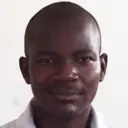 Ishaq Khalid
Ishaq Khalid
BBC News, Abuja
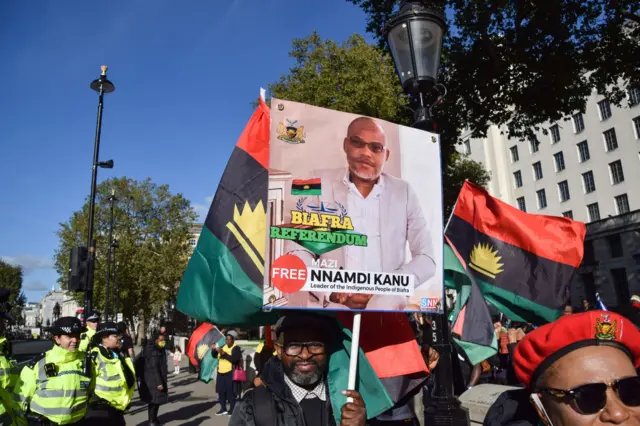 Image source, Getty Images
Image source, Getty ImagesThe new guidelines for terrorism trials came a day before a ruling on separatist leader Nnamdi Kanu
Nigerian authorities have issued new guidelines for trials of persons charged with terrorism in the federal high court.
The measures include a ban on media coverage of court proceedings unless ordered by the trial judge, according to a statement from the Nigerian federal court.
Only judges, lawyers and parties to a case are to be allowed into courtrooms.
There will be tight security during such trials, with members of the public barred from accessing the perimeter distance around the court building.
The identities and contact details of victims and witnesses shall not be disclosed for their safety.
Justice John Terhemba Tsoho, the chief judge of the federal high court, gave the new ‘’Federal High Court practice directions’’ to ensure ‘’security and safety’’, the statement noted.
It said that any person who violates the guidelines "shall be deemed to have committed an offence contrary to the country’s anti-terrorism law”.
The authorities say the measures announced on Thursday take immediate effect.
It comes a day before the trial of Nnamdi Kanu - the leader of the outlawed separatist movement known as the Indigenous Peoples of Biafra (Ipob) - resumes.
A ruling on charges filed against him by the Nigerian government - relating to treason and terrorism - is expected on Friday in Abuja.
Mr Kanu’s group is agitating for a breakaway state of Biafra in south-east Nigeria.
Emery Makumeno
BBC News, Kinshasa
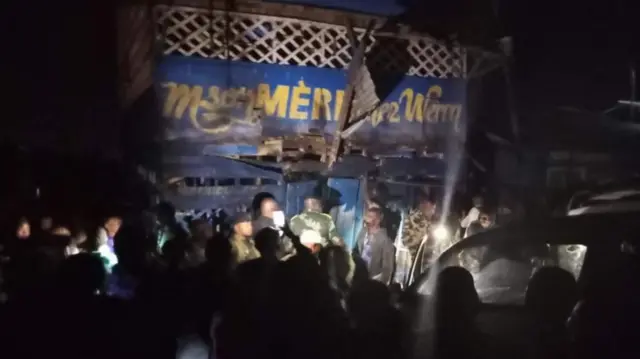 Image source, DR Congo Ministry of Communication
Image source, DR Congo Ministry of CommunicationAt least six people were killed and 15 others wounded after an explosion in a bar at the Katindo military camp in Goma, in eastern Democratic Republic of Congo.
The communication ministry tweeted, external on Thursday night that the number of the victims was provisional, while correcting an earlier higher death toll announced by government spokesman Patrick Muyaya.
Among the victims are a lieutenant colonel and his wife, a captain, the owner of the bar and her friend, as well as a 12-year-old teenager.
The circumstances surrounding the blast are being investigated by local authorities.
In late 2020, the government announced that the Katindo military camp would be relocated outside the city to reduce its proximity to Goma’s population of two million people. This however is yet to be implemented.
The DR Congo army is battling multiple rebel groups in the east – but it’s not clear yet whether the explosion was the result of an attack.
The North Kivu provincial military governor has called on people to be calm and avoid speculation pending investigations.
 BBC World Service
BBC World Service
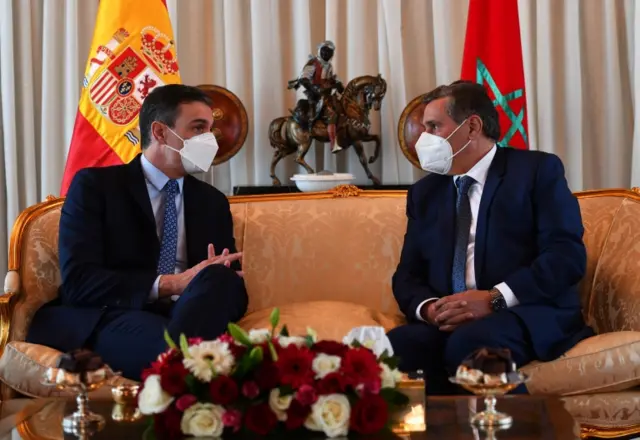 Image source, EPA
Image source, EPAMorocco and Spain have announced they have turned a new page in relations - after Madrid pledged support for Morocco's autonomy plan for the disputed Western Sahara.
During a meeting in Rabat, King Mohammed and the Spanish Prime Minister Pedro Sanchez said they were willing to usher in a new phase, "based on mutual respect, mutual trust, permanent consultation and frank and faithful co-operation".
In a statement, Mr Sanchez reaffirmed the autonomy plan as a realistic option for Western Sahara.
Morocco considers the former Spanish colony its own.
But the Algeria-backed Polisario Front wants to establish its own state.
Our proverb of the day:
Quote MessageA naughty child will be dead by the time he grows a beard."
A Bemba proverb sent by Watson Kabwe in Lusaka, Zambia.
A selection of the best photos from across Africa and beyond this week.
Read MoreWe'll be back on Friday morning
That's all for now from the BBC Africa Live team. There'll be an automated news feed here until we're back on Friday morning.
You can also keep up to date on the BBC News website, or by listening to the Africa Today podcast.
Our wise words of the day:
Quote MessageWhen asked to gather according to their tribe, the cowhide went to the cow."
An Oromo proverb from Ethiopia sent by Megersa Bayisa
Click here to send us your African proverbs.
We leave you with Instagram post showing a girl at home in Tshopo in the Democratic Republic of Congo, by photojournalist Ley Uwera.
Allow Instagram content?
This article contains content provided by Instagram. We ask for your permission before anything is loaded, as they may be using cookies and other technologies. You may want to read Meta’s Instagram cookie policy, external and privacy policy, external before accepting. To view this content choose ‘accept and continue’.
Richard Kagoe
BBC News, Nairobi
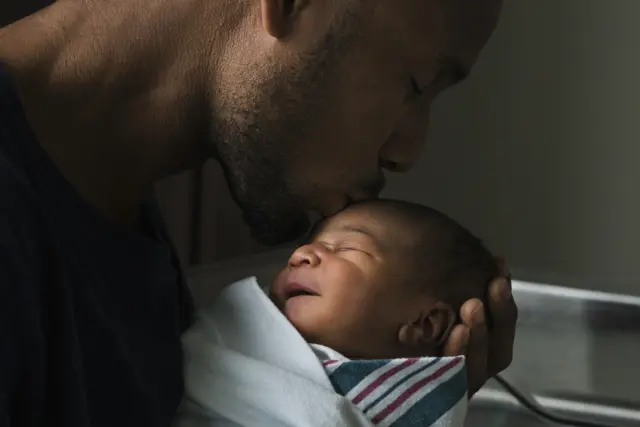 Image source, Getty Images
Image source, Getty ImagesThe mother in this case lives and works in the US
In a decision that has been hailed as unprecedented by legal experts, a Kenyan court has ruled that parental responsibility should not automatically go to women if children are under the age of nine, meaning men can also be offered custody now.
Under the Kenyan law, mothers are often granted physical custody of young children because they are viewed as the natural care givers. Men are only offered it under exceptional circumstances.
However, critics have argued the role of mothers has evolved to also include careers.
For the first time the courts used the best interest of child principle - citing article 53 of the constitution, which gives equality in parenting.
The judgement was delivered by Justice Joel Ngugi, who upheld the decision of a lower court granting custody to the father in the case.
The court directed the mother to handover the children, aged eight and 13, to their father. She will be given access to them.
The couple had been fighting over the custody of their children for some time.
 Mary Harper
Mary Harper
Africa editor, BBC World Service
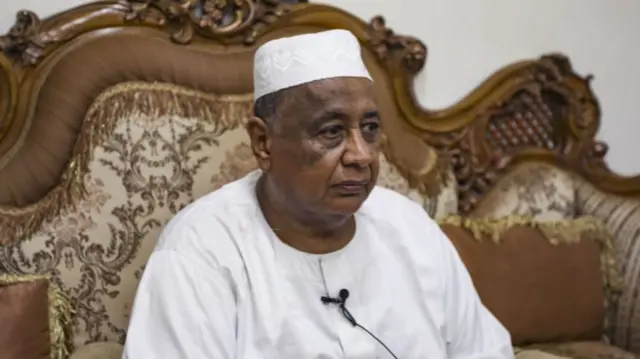 Image source, Getty Images
Image source, Getty ImagesIbrahim Ghandour served as foreign minister when Omar al-Bashir was president
A court in Sudan has acquitted 13 politicians and other people accused of plotting to disrupt the transition to civilian rule before it was derailed by a coup in October, including the head of the former ruling National Congress Party (NCP), Ibrahim Ghandour.
They had been accused of undermining constitutional order and financing terrorism during the short-lived transition.
All are linked to the government of former President Omar al-Bashir, toppled three years ago.
The NCP said it saw the acquittal as an opportunity to relaunch itself politically.
You may be interested in:
Brian Osweta
BBC News, Nairobi
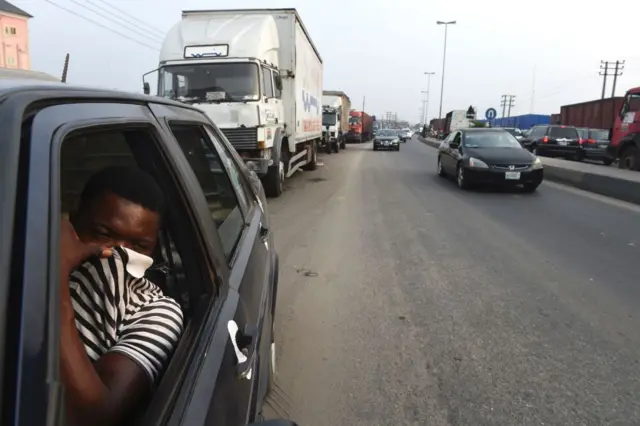 Image source, AFP
Image source, AFPHigh levels of air pollution can cause strokes, heart disease, lung cancer and other illnesses, the WHO warns
Non-communicable diseases, or diseases that are not transmitted directly from one person to another, are said to be on the rise in Africa as climate change continues to pose a big threat to health in the region, the World Health Organization (WHO) has warned.
Increasing temperatures mean mosquitos spread diseases further and faster than ever before, with serious consequences for African countries.
Deaths due to malaria in Africa now account for over half of all malaria deaths worldwide.
With fossil fuels responsible for most of the harmful emissions that are linked to acute and chronic sickness, the WHO has called for sensible steps to curb their use.
“During the past two decades, most public health events have been climate-related, whether they were vector- or water-borne, transmitted from animals to humans, or the result of natural disasters,” said Dr Matshidiso Moeti, WHO Regional Director for Africa.
According to Dr Moeti, non-communicable diseases are set to overtake communicable diseases, maternal, neonatal, and nutritional conditions combined, to become the leading cause of death by 2030.
The WHO has warned that more than 90% of people globally breathe unhealthy levels of air pollution. In Africa, lower respiratory infections are the second major cause of death.
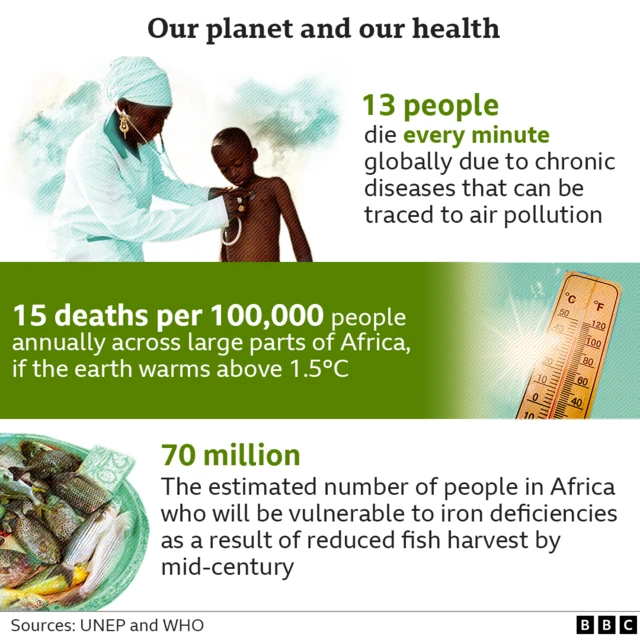 Image source, BBC News
Image source, BBC NewsSamba Cyuzuzo
BBC Great Lakes
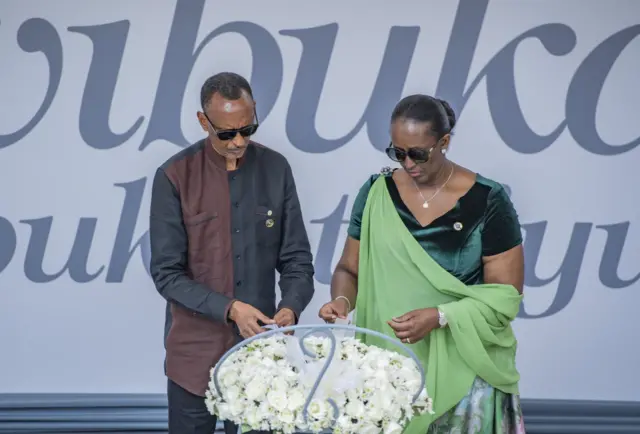 Image source, Rwanda Presidency
Image source, Rwanda PresidencyHypocrisy is “one of three systems that rules the world”, President Paul Kagame said, while condemning powerful countries for their reaction to the 1994 genocide in Rwanda.
Mr Kagame said that powerful countries idly watched the genocide happen, and so “have no lessons to teach anyone” and accused them of “covering up their responsibility” by talking about justice and democracy.
“There are three systems that govern the world, one is called democracy, the other is called autocracy, the third in between - most powerful, very silent, effective - and that is hypocrisy”, Mr Kagame said.
At Kigali genocide memorial centre, while officiating the start of a remembrance period for the genocide, Mr Kagame, a former rebel leader, said his forces avoided killings in reprisals as they were taking power in the wake of the genocide.
"Imagine those of us who were carrying arms - if [we] had allowed ourselves to pursue those who were killing our people, and also kill them," he said.
"First of all, we would be right to do so. But we didn’t, we spared them," he continued.
A UN experts report has accused the rebels, and then the army, led by Mr Kagame of committing atrocities on ethnic Hutu refugees in DR Congo who fled after the genocidal regime was defeated.
About 800,000 Tutsis and moderate Hutus were systematically killed in April 1994, after a plane carrying then-President Juvenal Habyarimana, and his counterpart Cyprien Ntaryamira of Burundi - both Hutus - was shot down, killing everyone on board.
Mr Kagame's mostly Tutsi rebel group, the Rwandan Patriotic Front (RPF), had been accused of shooting down the plane, while a Rwandan-government commissioned report blamed Hutu extremists.
The UN has dedicated 7 April an international day to reflect on the genocide against the Tutsis in Rwanda.
After fighting between government forces and M23 rebels, DR Congo refugees are returning home from Uganda.
Read More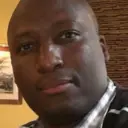 David Wafula
David Wafula
BBC News, Nairobi
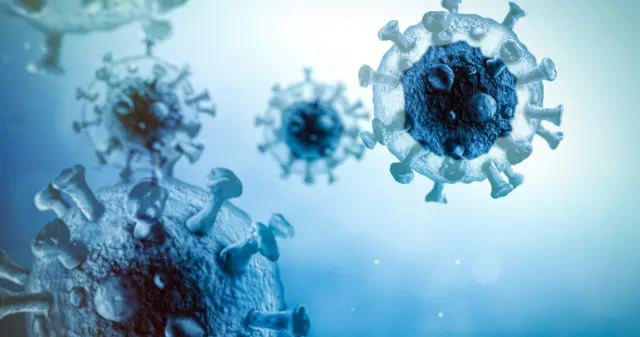 Image source, Getty Images
Image source, Getty ImagesThe World Health Organization (WHO) says that around two-thirds of Africans have been exposed to the Covid-19 virus.
A study has found a significant under-counting of infections on the continent because of so many cases with no symptoms.
This indicates that true infections on the continent were 97 times larger than reported confirmed cases.
Speaking to journalists, WHO Regional Director for Africa Dr Matshidiso Moeti said that the analysis showed that current reported Covid-19 confirmed cases were only a fraction of the actual number of infections on the continent.
Africa has had milder coronavirus cases compared with other parts of the world because there is a comparatively smaller proportion of people with risk factors such as diabetes, hypertension and other chronic diseases that are associated with more severe cases and deaths.
Africa’s youthful population is also a protective factor.
 Israel Campos
Israel Campos
BBC News
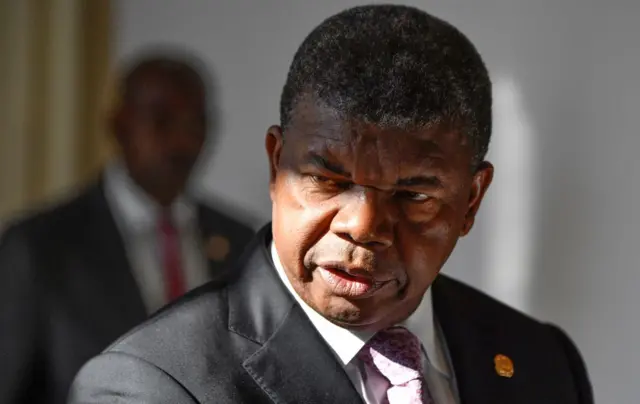 Image source, AFP
Image source, AFPJoão Lourenço has been the president of Angola since 2017
There was public outrage in Angola after President João Lourenço was accused of using the presidency's official Facebook page for political propaganda for his own party, the People's Movement for the Liberation of Angola (MPLA).
The controversial post was made on Tuesday after President Lourenço opened the MPLA's pre-election campaign in Cunene province, where he said that the Angolan opposition was "fragile" and promised to give them "a big defeat that will take them years to recover from” in the August elections.
In the Facebook post, there was an introductory note which said that the presidency's official page would henceforth also promote MPLA activities and events.
“As it is understood that, running for his party, the MPLA, he [President João Lourenço] does so also as President of the Republic candidate for re-election,” it said.
It did not take long for fury to emerge, both from opposition politicians and society at large.
Among them was an MP from the main opposition party, the National Union for the Total Independence of Angola (Unita).
“How disgusting!” MP Adriano Abel Sapiñala wrote on his Facebook page.
Political analyst Olívio Kilumbo says that this is one of many examples that show how the ruling party in Angola has used state means to gain political advantage over its opponents.
“This clearly demonstrates that we are not a democracy. If there was no public backlash, they would go ahead with this decision to promote political propaganda in a platform that is meant to be public,” he told the BBC.
The post was deleted 24 hours later, and no further comment has been made from the Angolan presidency.
Kalkidan Yibeltal
BBC News, Addis Ababa
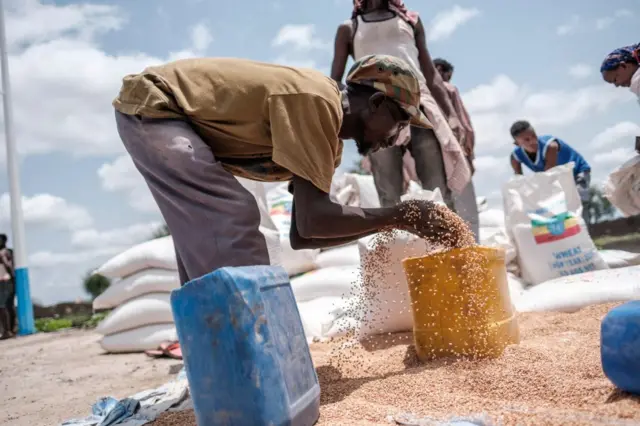 Image source, AFP
Image source, AFPThe government denies preventing people in Tigray from receiving aid
Sufficient aid is not getting through to reach millions of people in the war-torn Ethiopian region of Tigray despite a humanitarian truce agreed between the government and the rebels, the rebels say.
A hundred trucks of aid each day are needed, according to the UN.
Now Tigrayan forces say three times that amount is required as the region had been cut off from assistance for a long time and hundreds of thousands of people are on the brink of starvation.
The first convoys in months carrying food aid and fuel headed to Tigray last week creating hope for increased access.
But no other trucks have moved to the region in recent days, a senior Tigrayan official has told the BBC.
Communications Minister Legesse Tulu says the government has not put restrictions in place.
The amount of aid reaching Tigray “depends on supplies from aid agencies”, Mr Legesse told the BBC.
Read more: Ethiopia's Tigray war: Inside Mekelle cut off from the world